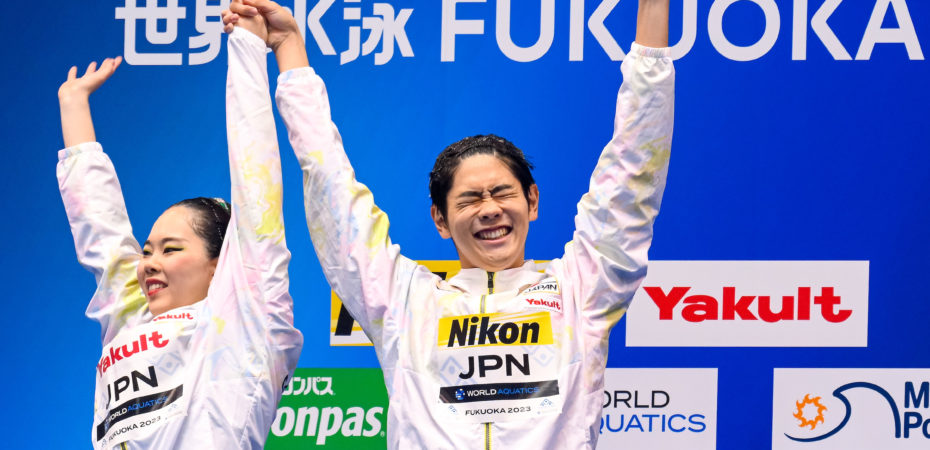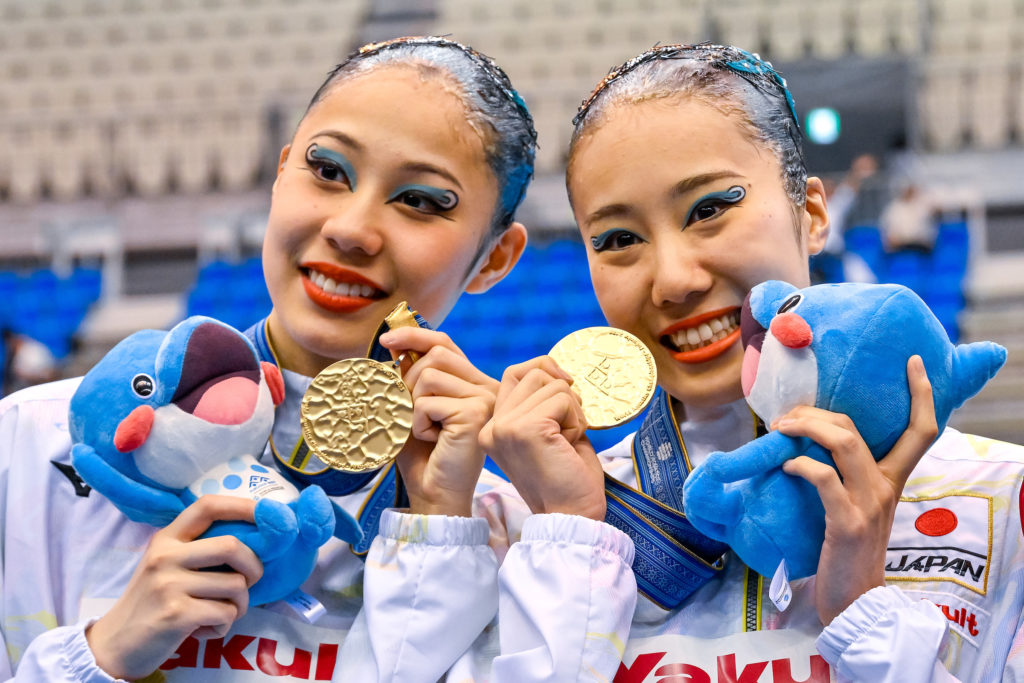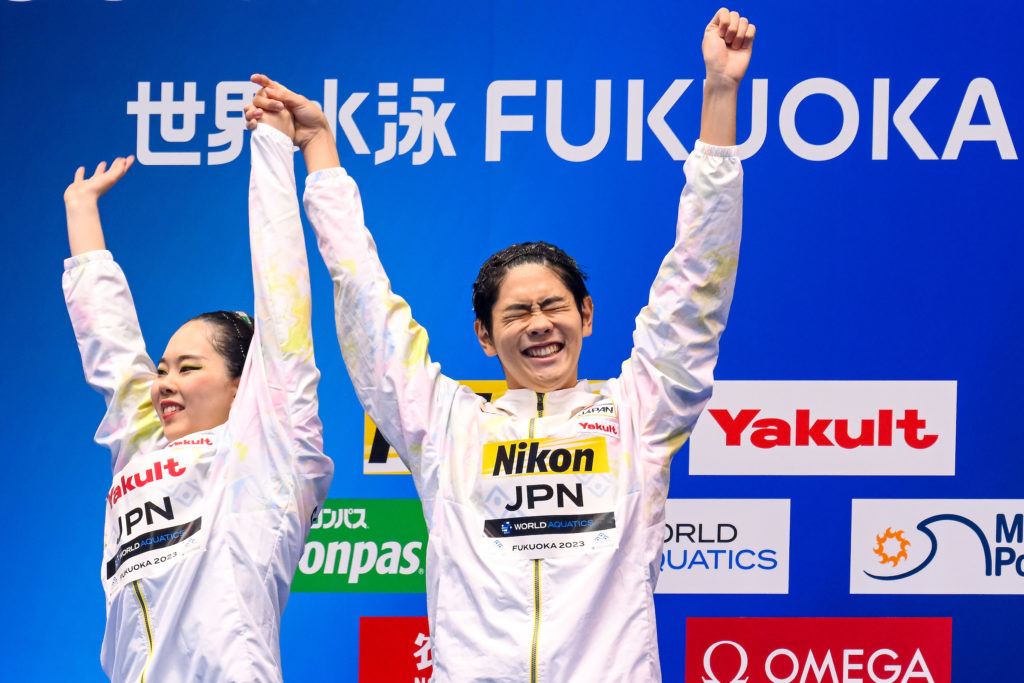On the third day of artistic swimming at the 2023 World Championships, Japan’s mixed duet and women’s duet brought home two more gold medals. Sato Yotaro and Sato Tomoka won a historical World title in the technical mixed duet in the afternoon, while Higa Moe and Yasunaga Mashiro won their own world title in the technical duet in the evening. Japan’s last gold in duet was also won in Fukuoka at the 2001 World Championships.
Additionally, the day started off with the technical team preliminary, which essentially turned into a base mark party for every country but four. After this event, China qualified for finals in first place with a score of 304.3992.
TECHNICAL MIXED DUET FINAL
Sato Yotaro and Sato Tomoka earned the second gold for Japan in the technical mixed duet final this afternoon with a score of 255.5066. The siblings, who were silver medalists in 2022, had qualified in third with a basemark. In the final, they were finally credited their full Degree of Difficulty (DD) of 30.30. With great execution and high artistic impression, their dynamic “Tarzan” routine won the home crowd over, and they again received 10s from the judges for their high-flying pair acrobatic.
“We are very happy,” Yotaro said. “I wanted to give back to the people who always supported us, so I was very happy that we were able to win a gold medal in front of them.”
“We prepared difficult hybrids,” Tomoka continued. “So we were sure that if we could make it and bring out the best performance, we would be able to win the gold. We didn’t change anything between preliminary and finals, but we felt the pressure, even in the preliminary.”
The two are thrilled to be able to share this World title together, and were very eager to show this medal to their parents who were in the stands today.
Emma Garcia and Dennis Gonzalez Boneu of Spain won silver with a score of 248.0499, narrowly edging out the Chinese pair by 0.7466. Spain has participated in every mixed duet event at the World Championships ever since it was first introduced in 2015, but it had yet to win a medal. Garcia and Gonzalez Boneu had qualified to the final in first position, and they again nailed their “Vivaldi’s Winter” routine today.
“We felt really comfortable from our swim from yesterday so we wanted to do the same, but enjoy it a little bit more,” Garcia said. “Of course, while staying focused on what we had to do. We knew the gold medal was super difficult but we fought until the end. We enjoyed it a lot and we are very happy about our performance.”
“Yes, the other countries had little mistakes in the preliminary and had better swims now in the final,” Gonzalez Boneu continued. “But silver is so good! It’s very exciting.”
Gonzalez Boneu’s competition is only getting started as he is also entered in the free solo and free mixed duet alongside Mireia Hernandez. Garcia is theoretically done competing, but she will keep training alongside the mixed duet as the reserve.
Shi Haoyu and Cheng Wentao of China won the bronze medal with 247.3033. The two actually hadn’t swam together in this routine since the Markham World Cup. In the preliminary, Shi competed alongside Zhang Yiyao, but they had received three base marks for their routine, which dropped them to seventh.
Due to an injury to Zhang, Cheng stepped into the duet in essentially 24 hours. Nonetheless, she is not completely new as she recently swam with him at the World Cup Super Final in Oviedo in the free event. In the final in Fukuoka, they swam their “Unstoppable”-themed routine confidently and were credited their full DD of 30.85, the highest of the field.
“We are really excited to get a medal today,” Shi said. ”We tried to be the best version of ourselves to focus on our own movements and elements, and we made it. But we have to stay focused because we still have more events in the coming days. We will continue to work hard for the team and for the whole delegation.”
Ahead of the final, only Mexico and South Korea had made changes to their DDs. Itzamary Gonzalez and Diego Villalobos of Mexico increased their DD from 27.975 to 28.60. The Mexicans had qualified in second place in the preliminary round. Unfortunately, they received a base mark on their opening acro in the final, which made them unable to compete with the top three nations that had put out clean performances this time. They finished fourth for their first World Championships together with a total score of 223.6066.
The Korean pair of Byun Jaejun and Kim Jihye went the other way, and changed its acro after receiving a base mark on it in the preliminary. In turn, their DD for the final slightly decreased to 23.70. Unfortunately, they received yet another base mark on it as well as an additional one on their final hybrid.
TECHNICAL DUET FINAL
“Unexpected” wouldn’t even begin to describe the women’s technical duet final. Every pair in the final but the top three received costly base marks, often sending shock waves through the crowd and the athletes themselves.
Higa Moe and Yasunaga Mashiro of Japan became World Champions with a score of 273.9500 for their “Mysterious” routine. The two had barely qualified to the final, placing 12th in the preliminary round after receiving two base marks.
In the final, they swam first and executed all their difficulty as planned, which they had notably increased by 0.2 to reach a DD of 34.30. They were already emotional upon seeing their score and realizing they didn’t have any base marks this time around. Ultimately, they hung on to the top spot until the very end.
“To be honest, we are happy but we are also very surprised,” Yasunaga said. “We were at the bottom, we were 12th, so the only way was up. That’s how we approached the final. We knew we had to give the best we could, and we did.”
With this title, Higa Moe is now a World Champion across all three age groups (youth, junior, senior) at only 15 years old.
Italy’s Linda Cerruti and Lucrezia Ruggiero swam right after the Japanese, and also didn’t receive any base marks for their “Phoenix” choreography. The Italians had found themselves eight in the preliminary, suffering one base mark on their final hybrid. They didn’t change anything for the final and kept their DD of 34.10, looking for a clean swim.
Just like the Japanese before them, they hung on to the silver medal position until the end. This is Italy’s first World medal in the duet.
“We didn’t even have our official tracksuits for the medal ceremony,” Ruggiero said, laughing. “We are just in our training suit, we weren’t expecting it at all. But we are so happy and proud. These new rules are really stressful for the athletes and the coaches, and that’s also with 14 days of World Championships. It’s all really hard mentally so I am proud of us. We focused on our goals today, and that was the most important thing.”
“We had a base mark on something that we never did so badly, so we knew we could do it well,” Cerruti said. “So we didn’t change anything and we focused on doing it like we do in training and this time, it worked. After the European Games, we changed the hybrids a lot because we had a lot of base marks there. This year, we have had to find and understand our way with these new rules, and maybe we found it.”
Alisa Ozhogina and Iris Tió of Spain won bronze with a score of 257.8368 for their “Baseball” routine. Like the Italians, the Spaniards had found themselves in the bottom half of the qualified nations after the preliminary round, finishing ninth with two base marks. For the final, they played it safe and reduced their DD by 0.40 to reach a total of 31.40. This is Spain’s first World medal in duet since 2013.
All three of last year’s World medallists found themselves outside of the podium, although they all had initially qualified in the top 3.
The first shock came as the defending world champions Wang Liuyi and Wang Qianyi of China received a base mark on their first hybrid, immediately taking them out of contention for a medal. The Ukrainian twins Maryna and Vladyslava Aleksiiva, 2022 silver medalists, faced the same fate soon after as they got two base marks on their free hybrids. At that point, the world title had suddenly become the Alexandri’s to lose, and they were swimming last. Unfortunately, the Austrians and reigning European champions also had a base mark on their first hybrid, dropping them to fifth behind the Chinese pair.
Shelly Bobritsky and Ariel Nassee of Israel had gone for broke in this final, declaring a massive 36.20 DD, a 2.80 increase since the preliminary. It didn’t quite work out as they’d have hoped as they received two base marks on their free hybrids and finished 12th with a score of 182.7332.
Finally, Maria Goncalves and Cheila Vieira made history for Portugal by qualifying and competing in this final. The pair finished 11th with a score of 208.4600 for its “Rodeo” routine.
“We didn’t realize that we had qualified,” Goncalves said. “We couldn’t believe it. Even today when we arrived to training before the final, we were almost like, ‘What are we doing here?’”
“We were not expecting this,” Vieira continued. “We have a Portuguese expression that translates to, ‘We landed here with a parachute’. That’s how it felt, being in the middle of everyone for the final, training with all these big countries. We were in shock, overwhelmed, and super happy with all of this. We weren’t expecting a medal, so we just wanted to enjoy being in this first final for Portugal. Of course we are a bit sad about the base mark, but we saw it happened to almost everyone.”
TECHNICAL TEAM PRELIMINARY
The third day of competition started off with the technical team preliminary. 22 teams faced off in the hopes of making the top 12 and hence qualify to the final. Unfortunately, it was yet again an event filled with numerous base marks. Of the 22 teams, only four made it unscathed: China, Greece, Israel and Singapore.
China, reigning World champions, came into this event with the highest declared DD of 40.20. The team was spectacular, nailing every element one after the other with great execution, precision and speed. The Chinese received their full difficulty for their “Speed and Passion” routine, scoring 304.3992 to qualify for the final in first place.
Greece swam in first in this preliminary round, and essentially hung on to the top spot until China performed its routine two hours later. The Greek team earned its full DD of 36.10 and scored 261.7013 for its “Rhythm” routine. Italy, which won silver at the European Championships, qualified in third with a score of 251.5379 and only one base mark with its “Fire” routine.
The other nations qualified to the final are the USA, Israel, Spain, Japan, Ukraine, Mexico, France, Australia and Egypt. Only Israel came away with a clean performance, receiving its full 33.10 DD for its “Birds of Prey” routine.
The USA and Australia both had one base mark. This will be Australia’s first team final since 2007.
Spain, the reigning European champion, had increased its DD by 0.7 since the European Games, where it had been the only country to not receive any base marks. Unfortunately in Fukuoka, the Spaniards had one base mark on their opening acro and one on their final hybrid.
Similarly, Japan, Ukraine, Mexico and Egypt also suffered two base marks. On top of that, the Mexicans also received 10.90 in synchronization errors as one of the athletes forgot to do a few movements in the final hybrid.
This is Egypt’s second qualification to a team final in Fukuoka, after making it to the acrobatic team event. The last time the nation had made a World team final was in 2009 in free combination.
France, European bronze medalist, received three base marks on all its free hybrids. Thankfully, the French’s high artistic impression score helped them hang on to a spot for the final. They qualified in 10th with a score of 208.6443. It wasn’t the case for the Canadians, who also suffered three base marks, but these dropped them to 14th.
Undoubtedly, all teams will strategize properly ahead of the final to ensure they won’t receive any base marks and will have a shot at the medals.
Nicolas Campos of Chile was the sole man to swim in a technical team routine. The 15-year-old was also one of the youngest athletes to compete today, and did a superb job performing alongside his teammates for the first time.
The technical team final will take place on Tuesday, July 18 at 7:30 pm local.
ARTICLE BY CHRISTINA MARMET
Photos: Giorgio Scala / Deepbluemedia
Purchase photos of the competition on Deepbluemedia with the code “INSIDESYNCHRO” for 15% off!




Yes, “unexpected” technical duet final, so to speak… After several championships with the new scoring system, I still think that its basic structure is not correct, it doesn’t seem to be working right. It looks that they are hastily made rules. The base marks are a “dog’s breakfast”, it is like a crocked deal, and I don’t believe they are fair enough. Shame.